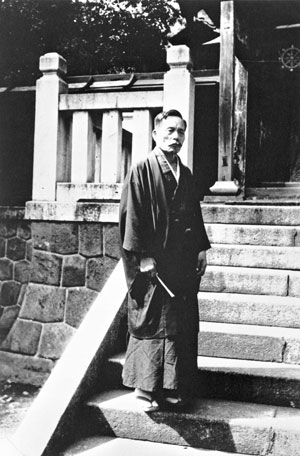Tsunesaburo Makiguchi (1871–1944) was the first President of the Soka Gakkai. He was a pioneering educator, author, and philosopher. He founded the Soka Kyoiku Gakkai (Society for Value-Creating Education), the forerunner of the Soka Gakkai on November 18, 1930, together with his closest disciple Josei Toda.
Born on 6th June 1871, Makiguchi studied widely during his youth. His first-hand experiences of the pronounced gap in opportunities between the powerful elite and the powerless masses left a strong impression on him and he decided to build his career as an educator. In 1903, aged 32, he published his first major work, titled ‘The Geography of Human Life’.
Ideas on Education
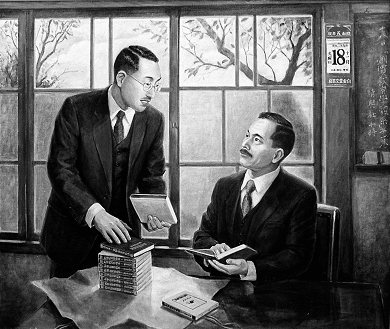
Tsunesaburo Makiguchi (right) and Josei Toda (left) holding copies of the first book in Makiguchi’s work Soka Kyoikugaku Taikei (The System of Value-Creating Pedagogy) on the day it was published—November 18, 1930 [by Kenichiro Uchida; © Seikyo Shimbun]
For most of his life, Makiguchi sought to reform the Japanese education system as he felt it discouraged independent thinking and stifled students’ growth and creativity. He believed that education should contribute towards the happiness of students, rather than simply serving the needs of society or the state.
While as a teacher and principal, Makiguchi was always known for his warmth and consideration, his life was characterized by confrontation with repressive authorities. Regardless of all the oppressions, he always strove to introduce a more humanistic, student-centred approach to education.
His educational ideas, and his theory of value-creation (Soka) are explored in his work ‘Soka Kyoikugaku Taikei’ (The System of Value-Creating Pedagogy), published in 1930.
Founding the Soka Gakkai
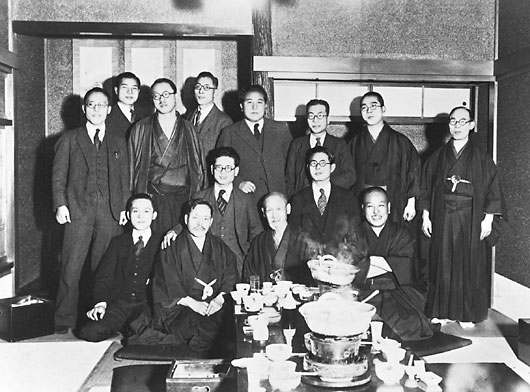
At a Soka Kyoiku Gakkai gathering (front row, 2nd from left) with Toda (back row, 3rd from left)
In 1928, aged 57, Makiguchi encountered Buddhist teachings, thus finding a humanistic philosophy which accorded with his own thinking.
In 1930, Makiguchi and his protégé Toda together founded the ‘Soka Kyoiku Gakkai’ (Society for Value-creating Education). Both Makiguchi and Toda were convinced that this philosophy, which focuses on the inner transformation of an individual, was the means to achieving fundamental social reform which they had been trying to accomplish through their educational efforts.
Theory of Value
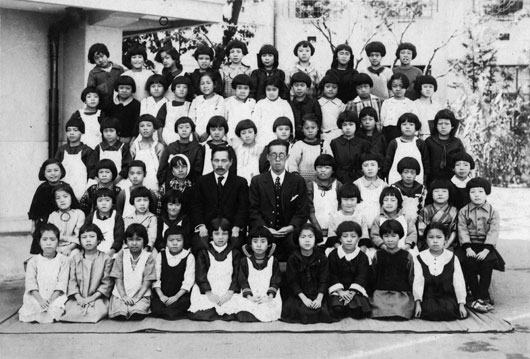
With girls from Shirokane Elementary School school, 1930 (2nd row, 5th from left)
Makiguchi regarded that “value” contained the answer to the various questions of life. He writes: “Just as good, beauty and gain are values, happiness is equally value; as a concept, happiness includes, embraces and integrates these other values.” (Complete Works of Tsunesaburo Makiguchi, (in Japanese) Daisan Bunmeisha, Vol 6, pg 381)
Looking concretely at the different forms of value that together constituted happiness for Makiguchi, “beauty” is esthetic value that enhances specific aspects of the individual’s life; “gain” refers to all that concretely enhances the entirety of an individual’s existence; and “good” is that which enhances the life of an entire community or society. Here, also, value does not point to something abstract or disembodied, but to the positive transformation of our actual experience of life. Strengthening the capacity of people to create value (to effect the positive transformation of reality) was thus for Makiguchi the ultimate goal of educational efforts. Soka is an abbreviated form of the expression kachi sozo (value creation) which Makiguchi adopted at the suggestion of his disciple Josei Toda; soka, the creation of value, became the heart of his educational philosophy and of the larger movement and organization he founded.
Imprisonment and Death in Prison
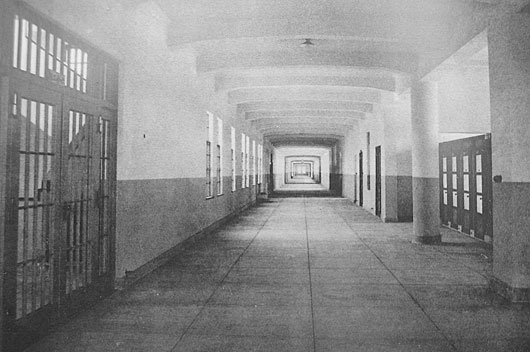
Tokyo Sugamo Prison (Photo by Tokyo Kochisho)
Makiguchi was sent to Sugamo Prison in Tokyo on 25th September 1943 where he was subjected to harsh interrogation and extreme hardship with the authorities forcing him to recant his beliefs. However, Makiguchi refused to do so till the end of his life. He died in prison aged 73 on November 18, 1944.
Makiguchi’s educational ideas have been further implemented by Josei Toda’s successor, Daisaku Ikeda, who has established a network of Soka schools from the kindergarten to post-graduate university level in Japan and throughout the world. In recent years, his educational theories have attracted increasing international attention, inspiring a growing body of research and innovative projects around the world.




